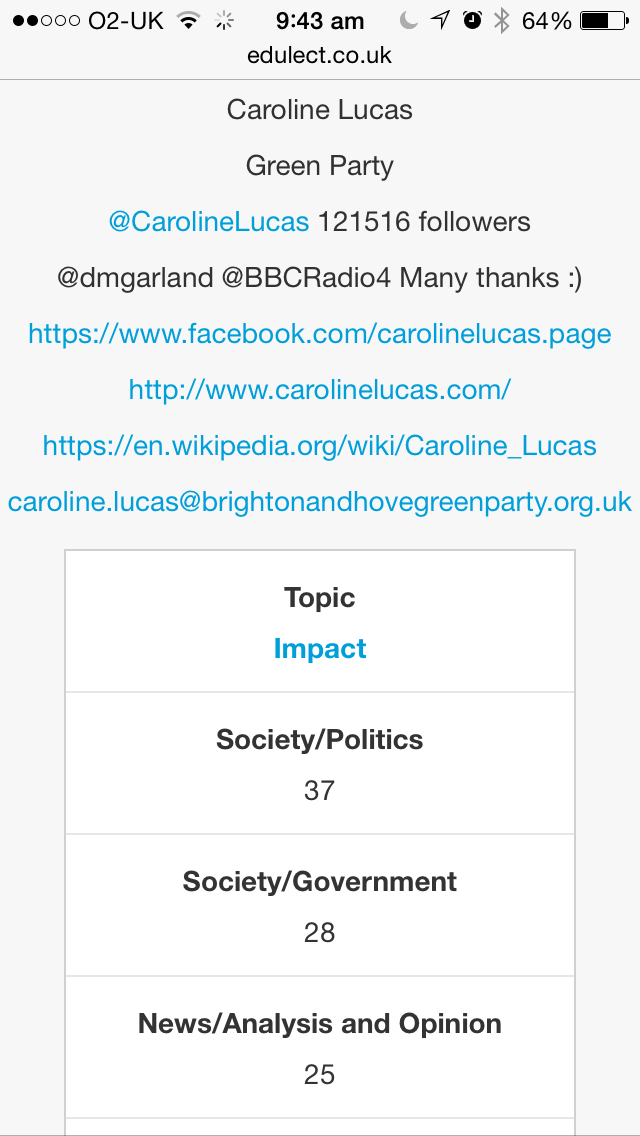
Some clever students have created www.edulect.co.uk which I recommend everyone in the UK try for 60 seconds before the election. No login. No cost. But you will be a much more educated voter.
The Problem: We are all individuals, with different needs, but every five years we vote for a party, which (in no way) will represent us, instead of a person.
This solution lets you instantly see which candidate has the potential to impact areas that affect me and vote for them instead of the party they stand for.
The great thing is that it does not measure what the candidate says to measure impact, so a candidate’s rhetoric is not so likely to sway you.
The Edulect site is a free tool that needs no sign up or fee. You simply put in your postcode and the site first calls “whosypunextmp.co.uk” to get a list of candidates. But then it looks up their Twitter handle, or web profile URL. That’s the key, because they can then show you how much impact each candidate is likely to have in any of about 800 categories, by converting Topical Trust Flow into an impact metric!
Interested in parliament spending more time on the Health service!? Look for candidates with a score in a health category. Want more attention to the Arts? That’s there too.
Even though the app was crudely built (in 24 hours straight, with no sleep), I think it is a hugely significant step in how our approach to democracy should change in a world with more than 2 party politics. The biggest challenge in parliament is not money or parties. It is time. Getting the things you care about even onto the agenda is almost impossible – and if Parliament is discussing the wrong agenda for you, then it is probably because the people we voted for are not passionate or knowledgable about the things we want. Even if you vote for a candidate strongly opposed to your view on (say) electronic cigarettes, you are more likely to get your opinion onto the agenda by voting for someone that has any opinion at all that voting for a patsy, just parachuted in from some party HQ to make up the numbers.
60 Seconds you say? Show me.
Well if you read this far, you could have tried it already – but this is the screen you are trying to get to:
As I have just returned from Brighton I thought I would bring up the data for the UK’s only Green MP.
What did the “Impact” Scores mean?
They are log based scores between 0 and 100. They are in fact Topical Trust Flow scores from Majestic, but the students didn’t want voters to feel that these scores in any way suggested you could TRUST the candidate in any given area, only that they had or could make some IMPACT in that area. (Right there the students hot extra brownie points for understanding the underlying data!).
Why do so many Candidates have no impact scores?
Honestly? I think it is because they have not yet given any evidence that they CAN make any impact! There will be exceptions, of course, but if a tree falls down in the woods and there is nobody in earshot, does the tree make a sound?
- How Important will Backlinks be in 2023? - February 20, 2023
- What is in a Link? - October 25, 2022
- An Interview with… Ash Nallawalla - August 23, 2022








Very interesting idea this has really big potential. If i understand it correct, (please correct me if i am wrong), then only the incoming links to the websites and socialmedia accounts of these politicans are being used to get the TrustFlow data on their specific topics. But this makes it also difficult to get data for less influential politicians that have only very few incoming links to their pages.
Perhaps TopicalTrustflow analytics could also be done in the other direction, by analizing the outgoing links that have been postet on twitter and the websites of the candidates. A politican who is interested in lets say healthcare is more likely to share Links on Twitter to websites that have a high trust in health realted topics.
Edulect did not show any topics for some lesser known candidates, but some of this candidates had very active twitter accounts, thousands of tweets often linking towards news sites, articles that have topics like healthcare, poverty or civil rights. Perhaps by analizing all of this outgoing links it may be possible to get quite detailed informations about the topics a candidate is interested in and how often this topics appear on their socialmedia timeline.
As example, Elaine Bagshaw (Liberal Democrats http://www.edulect.co.uk/postcode/E10AA) has no topics shown on edulect, but her twitter account has a huge number of tweets linking to political websites, analizing this Links may give more informations on her specific topics of interest. Get the topics of all this links and then summate the TrustFlow value of all the topics to get a ranking on what topics appear to be most important for the candidate.
Perhaps it would be possible to see the Topics a politician is interested in by analizing outgoing links. And then analizing the influence by having a look on the incoming Backlinks, this can be interesting cause one could have a look if a candidate is really influential in the topics he/she is interested in.
What do you think ?
April 15, 2015 at 12:56 pmHi Max,
Thanks for looking!
I agree that analysing where they link to will help to tell you what they talk about… but not necessarily whether anyone cares! Of course in practice it is chicken and egg… you cannot be influential until you get INTO power and (using this) you are less likely to be seen as influential UNTIL you wield some power. I think the Edulect site linking to a candidate’s Twitter stream help to see what they have to say. Majestic’s data may be less granular, but useful as it is otherwise very hard to measure the likely impact of the PERSON standing, regardless of their party.
April 16, 2015 at 12:22 pmwoww very Very nice
April 17, 2015 at 12:10 am